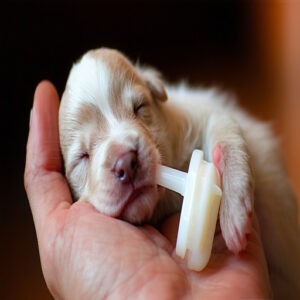This site is supported by our readers. We may earn a commission, at no cost to you, if you purchase through links.
 Losing a puppy leaves an aching void in your heart.
Losing a puppy leaves an aching void in your heart.
When faced with a dead puppy, handle the remains with care and respect while following local regulations.
Several factors can lead to puppy loss, including genetic issues, nutritional deficiencies, infections, and exposure to harmful substances.
Work closely with your veterinarian to understand the cause and guarantee proper care for the mother dog and any surviving puppies.
Early detection of health issues through regular check-ups, proper nutrition, and a clean environment can help prevent future losses.
Understanding the complex interplay of genetics, nutrition, and environmental factors offers valuable insights for protecting future litters.
Table Of Contents
- Key Takeaways
- What Causes Puppies to Be Born Dead?
- How to Prevent Stillborn Puppies in Pregnant Dogs?
- How to Know if Puppies Are Dying
- How to Take Care of The Mother and Puppies
- How to Help a Mother Dog Mourning for Lost Puppies
- What to Do if Your Dog is Having a Difficult Time in Labor
- What to Do After a Mother Dog Gives Birth
- Should I Remove Puppies Dead at Birth?
- Can Having Stillborn Puppies Cause Trauma to The Bitch?
- Frequently Asked Questions (FAQs)
- What to do if a puppy dies?
- What should I do if my pet dies at home?
- What if a dog dies at home?
- What should a mother dog do if her puppy dies?
- What if my dog keeps looking for a dead puppy?
- How do you take care of a dead puppy?
- What do you do with a puppy after it dies?
- What to do if a puppy dies at home?
- Do all puppies usually survive in a litter?
- Do dogs mourn their dead puppies?
- Conclusion
Key Takeaways
- Let the mother dog spend about 15 minutes with her deceased puppy to process the loss, then carefully remove it using gloves.
- Wrap the puppy in a soft material, place it in a sealed bag or container, and contact your vet for options like cremation or burial.
- Monitor the mother for signs of grief or distress, providing comfort and maintaining routines to support her emotional recovery.
- Schedule a vet examination for the mother and surviving puppies to check for health issues and prevent further complications.
What Causes Puppies to Be Born Dead?
When puppies are born still, it’s often due to factors like infections, complications during birth, or genetic problems. Understanding these causes helps you take steps to protect future litters.
Genetic Factors
Sometimes, the heartbreaking issue of stillborn puppies traces back to their genes.
Hereditary diseases or congenital abnormalities caused by poor breeding choices are common causes of stillborn puppies.
To reduce risks, take these critical steps:
- Genetic testing/DNA analysis: Screen both parents to catch harmful mutations.
- Research your breed’s risks: Some breeds are prone to genetic issues.
- Avoid inbreeding: Breeding close relatives increases defects.
- Partner with a vet: Plan safe breedings together.
Thoughtful breed selection can guarantee better chances and prevent stillborn puppies.
Nutritional Deficiencies
A poor diet during pregnancy can lead to food deficits that harm both mom and her unborn pups.
Puppy malnutrition is one of the stillborn puppies’ causes, as dietary imbalance affects everything from fetal growth to smooth labor.
Key nutrient needs include protein for growth, calcium to avoid labor issues, and fatty acids for thriving pups.
For instance, moms low on vitamins risk puppy death or fading puppy syndrome.
Work with your vet to nail dog nutrition for a healthier litter.
Healthy food = healthy pups!
Infections
Infections are sneaky villains regarding stillborn puppies or sudden neonatal losses.
From bacterial spread to viral outbreaks like canine herpesvirus, these dog health issues can turn heartwarming moments into heartbreak.
Fungal diseases or parasite control may not always be top of mind during pregnancy, but they’re key players in protecting immune systems.
One common condition, fading puppy syndrome, often stems from infections, leaving tiny pups too weak to thrive.
Protecting your dog means gearing up for battle.
Regular vet visits, good hygiene, and proper nutrition stack the odds in your favor.
Don’t underestimate vaccines—they’re your shield against nasty pathogens.
- Cleanliness matters: Keep the whelping area spotless to stop infections in their tracks.
- Early detection saves lives: Discuss bacterial or viral risks during routine veterinary check-ups.
- Strong moms, strong pups: Boost the mom’s immunity with balanced nutrition and parasite control.
Medications and Toxins
Toxic substance exposure isn’t always obvious—it could mean anything from spilled cleaning products to flea treatments not safe for pregnant dogs.
Even a seemingly harmless medication can pose risks; too high a dose may harm the unborn puppies.
That’s why medication errors during pregnancy can lead to heartbreaking outcomes like stillborn puppies.
Your dog’s environment matters too.
Contaminants like lead or pesticide residue can sneak in unnoticed, putting the entire litter at risk.
Always prioritize veterinary guidance when using any product or medicine.
Poison control hotlines and toxicology testing might save lives.
Protect your dog by keeping hazards out of reach—better safe than facing dead puppy removal instructions.
Congenital Defects
Congenital defects are a heartbreaking part of what causes stillborn puppies, often tied to genetic mutations or disruptions in fetal development.
Some breeds are genetically predisposed, so investing in genetic testing before breeding can feel like discovering a key—revealing risks early and making stillborn puppies prevention more achievable.
Think of prenatal care as laying the foundation for healthy neonatal health. A balanced diet and avoiding toxins during pregnancy may seem simple, but they’re powerful ways to protect developing pups.
If dead puppies are born after giving birth, don’t brush it off. Consult your vet to explore potential links to birth defects, guiding safer, healthier litters in the future. Proactive care today means fewer stillborn puppies tomorrow.
Understanding diabetic dog care is vital for identifying health issues early on.
How to Prevent Stillborn Puppies in Pregnant Dogs?
Taking steps to guarantee a healthy pregnancy for your dog can greatly reduce the chances of stillborn puppies.
With proper care, regular vet visits, and attention to the mother’s well-being, you’re giving those puppies the best start possible, which includes having a mother’s well-being that is well cared for.
Proper Nutrition and Diet
A balanced diet makes all the difference in your pregnant dog’s health, boosting puppy nutrition and preventing complications like stillbirth.
Focus on proper nutrient balance with these easy-to-follow diet plans:
- Select high-quality puppy food loaded with protein, fat, and essential nutrients for puppy development.
- Space her meals wisely with a consistent feeding schedule to prevent stomach upset.
- Add healthy snacks like cooked eggs or yogurt for an energy boost.
- Control meal portions, adjusting for steady weight gain without overfeeding.
- Avoid sudden diet changes unless guided by a vet to maintain canine health.
Proper nutrition for pregnant dogs requires a pregnant dog diet that supports their overall health and the health of their puppies.
Good food equals healthier litters!
Regular Veterinary Check-ups
Keeping your pregnant dog healthy isn’t just nice—it’s essential, and regular veterinary check-ups are the backbone of a safe pregnancy.
These visits let your vet act like a detective, spotting issues early and helping you avoid heartbreak, like a stillborn puppy.
From keeping up with vaccines to guaranteeing parasite control, these Puppy Health Checks are game changers.
Your vet monitors fetal development through scans, offers Dog Nutrition Advice, and adjusts Pet Wellness Plans as needed.
They’re also your go-to for labor emergencies, possibly even resuscitating struggling puppies.
Think of check-ups as your puppy insurance policy—better to invest time than face regrets.
Check-Up Milestone Why It Matters
| How It Helps |
|---|
| First Trimester |
Avoidance of Harmful Medications and Toxins
When your dog is pregnant, medication risks are no joke—always ask your vet before giving anything, even herbal remedies.
Some seemingly harmless treatments could lead to complications like stillbirths.
Also, keep an eye on toxic substance avoidance.
Cleaning products, pesticides, and certain foods can pose hidden dangers.
Create a safe environment for your dog by removing harmful chemicals and keeping her stress-free.
If you notice a dead puppy during labor, don’t DIY—follow dead puppy removal instructions and reach out to a vet immediately.
Whether you’re considering how to bury a dead puppy or need extra pet loss support, professionals can help.
Genetic Testing and Breeding Selection
Preventing stillborn puppies starts with smart planning and breeding strategies.
When you understand your dog’s genetic makeup, you’re one step closer to minimizing risks like hereditary diseases or other stillborn puppies causes.
DNA screening is a game-changer—it helps identify genetic markers that could lead to puppies born dead.
Here’s how to approach it:
- Learn the breed’s risks: Every breed has quirks.
- Use DNA testing: Screen both parents to catch potential issues before they’re passed on.
- Pick healthy studs: A good stud should offer solid genetic health, not just a shiny coat.
- Evaluate both parents: Genetic compatibility matters—don’t skip testing for either dog.
- Lean on experts: Breeding specialists and veterinarians are your best allies.
Thoughtful breeding guarantees healthier puppies.
How to Know if Puppies Are Dying
It’s heartbreaking to watch a puppy struggle, but knowing the warning signs can help you act quickly.
Look for changes in activity, nursing, and breathing to spot if something’s wrong.
Signs of Distress or Weakness in Newborn Puppies
Recognizing distress in newborn puppies isn’t always easy, but it’s an important part of newborn care.
Keep an eye on their signs of health—cold, sluggish pups or those moving less may struggle with neonatal health issues.
Puppies with shallow breathing or weak reflexes might point to trouble too.
A pup refusing to nurse or lying apart from the litter needs attention fast.
Fading puppy syndrome could be the culprit if you notice a quiet puppy with reduced movement and poor suckling.
Sadly, you might even find a dead newborn pup in the litter—heartbreaking, but it signals something’s wrong.
Spot these warning signs early and call your vet to confirm the surviving pups get the help they need.
Lack of Nursing or Failure to Thrive
If a newborn refuses to nurse or weakly suckles, don’t shrug it off—it could indicate fading puppies or issues with puppy nutrition.
Weak suckling, weight stagnation, or crying suggest they’re struggling to thrive.
Immediate action is key; even one missed feeding can spiral into trouble.
- Track growth: Weigh puppies daily and note any alarming patterns.
- Support feeding: Try hand-feeding or supplemental milk if the mother’s supply falters.
- Check maternal health: Poor milk production or infection might be causing the problem.
Ensuring proper post birth care is essential for the health of both the mother and the puppies.
Neonatal care is your first defense to prevent more dead puppies after birth.
Abnormalities in Breathing or Temperature Regulation
Breathing issues and poor temperature control in newborns can quickly turn serious.
Look for signs like shallow breaths, gasping, or becoming cold to the touch—these can hint at conditions like respiratory distress or neonatal hypoxia.
Struggling to stay warm? It could lead to hypothermia or worse, stillborn puppies.
Act fast and call your vet. Quick action could save a fragile life and prevent any more dead puppies after giving birth.
How to Take Care of The Mother and Puppies
Caring for a grieving mother dog while ensuring her health and the well-being of her puppies can feel overwhelming.
By keeping her comfortable, well-nourished, and closely monitored, you’ll give them the best start possible.
Providing a Clean and Comfortable Environment
Keeping the nursery setup clean and cozy helps everyone stay healthy and calm.
Soft bedding gives the puppies comfort while supporting the mother’s recovery.
Sanitary practices like wiping surfaces with a bleach solution and regularly changing bedding reduce germs and odors.
Keep the space draft-free and maintain steady temperatures—puppies can’t regulate their bodies yet, and the mother needs to feel safe.
Ventilation is key; no one thrives in stale air.
If a puppy died, let the mother grieve briefly, then follow proper dead puppy disposal methods.
Creating a peaceful, hygienic environment supports healing and eases pet loss grief for both you and your dog.
Proper puppy bedding sets are essential for the comfort and health of the puppies and their mother.
Ensuring Adequate Nutrition and Hydration for The Mother
Caring for a mom dog whose pups die or survive starts with hydration and a nutrient-rich diet to aid recovery.
- Offer fresh water throughout the day.
- Feed high-quality food 3-4 times daily.
- Use supplements if a vet recommends.
- Verify steady weight through Maternal Health Checks.
- Stick to familiar foods; sudden changes upset digestion during this vital Postpartum Care period.
Monitoring The Puppies’ Health and Development
Tracking newborn puppies’ progress keeps puppy care and safety on point.
Start by monitoring their weight gain daily using a small, reliable scale—steady growth signals good health.
Watch their nursing behavior too; puppies that struggle to latch or nurse might need extra attention.
Keep tabs on their temperature regulation—puppies can’t control their body heat early on, so consistent warmth matters.
Notice how their socialization progress unfolds.
Puppies should crawl within days, showing curiosity and activity.
Also, observe their elimination patterns—diarrhea or irregularities can point to trouble.
Jot down everything in a daily log—it’s your cheat sheet for spotting potential problems early and ensuring puppy health.
Don’t skip that vet check!
Assisting With Nursing or Bottle-Feeding if Necessary
Caring for newborn puppies sometimes means stepping in, especially if the mother struggles, the mother dog survives after her puppies die, or you’re dealing with orphaned puppy care.
Bottle feeding can feel challenging, but it’s manageable with the right nursing techniques and a little practice. Here’s your guide:
- Pick the right tools: Use a vet-approved milk replacer (no cow’s milk!) and make certain the bottle’s nipple fits snugly in tiny mouths.
- Feed often: Stick to a 2-3 hour schedule, even at night, so newborn puppies stay nourished.
- Tummy time: Massage their bellies gently after feeding for digestion support.
- Track growth: Weigh them daily to catch any concerns.
- Start weaning: Introduce soft solids around 4 weeks to begin the weaning process.
How to Help a Mother Dog Mourning for Lost Puppies
Helping a grieving mother dog can feel overwhelming, but your gentle support makes a big difference. Give her time to process while offering comfort and attention to ease her sadness.
Allowing The Mother Time and Space to Grieve
When a mama dog mourns her loss, it’s essential to give her quiet time to grieve.
Let her sniff or nuzzle her dead puppy first—this act of saying goodbye helps her mentally process the death.
Build a peaceful space where distractions are minimal, supporting her emotional healing.
Don’t rush her; grieving isn’t linear.
Here’s a quick perspective:
Behavior
Meaning
| Response |
|---|
| Sniffing the dead pup |
Providing Comfort and Reassurance to The Mother
When a mother dog is mourning the loss of puppies, your calm presence can mean everything.
Sit close by and speak softly—it’s all about reassurance.
Here’s how to provide maternal care:
- Create a quiet, cozy area just for her.
- Handle her with patience and love.
- Offer familiar blankets or toys.
- Stay nearby to provide gentle company.
Engaging in Activities and Play to Distract and Uplift The Mother’s Mood
Short walks or playful interactions with gentle exercise can uplift a mother dog mourning loss puppies.
Use calming techniques like offering her favorite toy or small treats during these moments.
Positive reinforcement helps show her she’s valued.
Keep activities light—let her set the pace.
Mom dogs whose pups die benefit from this care, redirecting their energy and offering comfort during grief with positive reinforcement.
What to Do if Your Dog is Having a Difficult Time in Labor
If your dog seems to be struggling during labor, it’s important to stay calm and act quickly.
Watch for signs like prolonged contractions or a stuck puppy, and don’t hesitate to call your vet.
Understanding The Stages of Labor in Dogs
The whelping process begins with subtle labor signs like restlessness or panting.
As contractions intensify, watch for active pushing, signaling puppy delivery.
Ideally, each puppy arrives within 30-60 minutes, though short breaks between births are normal.
Knowing these stages of canine obstetrics guarantees you’re prepared and aware of potential issues, like dystocia.
Understanding the whelping process is essential to support your dog during labor and guarantee successful births.
Recognizing Signs of Labor Complications
Being alert during your dog’s labor can mean the difference between life and death.
Watch for these warning signs that indicate birth complications:
- Green or black discharge before the first puppy emerges
- Straining for over 30 minutes without producing a puppy
- More than 2 hours between delivering puppies
- Excessive bleeding or bright red discharge
- Strong contractions lasting over 45 minutes without results
When you spot fetal distress or labor pain signs, don’t wait – call your vet immediately, as quick action prevents stillborn puppies and protects maternal health.
Recognizing dog labor signs is essential for a safe delivery, and remembering that successful birthing usually progresses steadily without long pauses or intense distress is crucial.
Seeking Veterinary Assistance and Intervention if Needed
Life-saving minutes matter when labor goes wrong – the latest veterinary guidance emphasizes swift action.
You’ll want to call for emergency care at the first sign of trouble, like green discharge or straining without progress for 30+ minutes.
Thanks to updated protocols, your vet can now access advanced intervention techniques that weren’t available even a few years ago.
They’ll determine if your pup needs assisted delivery or an emergency C-section to protect both mom and babies.
If you’ve experienced a puppy loss, your vet will guide you through proper postpartum support and may recommend an examination to understand why it happened.
Remember, pet death is never easy, but professional veterinary guidance helps guarantee the best possible outcome for surviving puppies and mom.
Trust your instincts – when something feels off, make that call.
What to Do After a Mother Dog Gives Birth
You’ll need to keep a close eye on your mother dog and her newborn puppies during the first critical hours after birth.
Watching for any signs of distress or complications is crucial, as it allows for early intervention if needed.
If you notice anything unusual, such as excessive bleeding, lethargy, or puppies that aren’t nursing well, don’t wait to call your vet for guidance and support.
Cleaning and Caring for The Mother and Puppies
Gentle postpartum hygiene becomes your first priority after whelping, which includes cleaning your dog with warm, damp cloths rather than a full bath to minimize stress.
You’ll want to swap out soiled bedding daily, maintaining a pristine whelping box for recovery, and focus on high-quality nutrition for the mother to support milk production.
Keep the temperature cozy for the newborns and watch them closely to verify they’re nursing effectively.
Regular use of a whelping box cleaner is essential for preventing the spread of disease and maintaining a healthy environment for the puppies.
Monitoring for Signs of Infection or Complications
A quick glance can make all the difference in your new puppies’ health.
Watch these key warning signs in your furry family:
- Hot, swollen mammary glands or strange-colored discharge from mom
- Pups refusing to nurse or feeling cool to your touch
- Mom’s temperature spikes above normal or she seems sluggish
- Placentas or excessive bleeding that hasn’t passed within 24 hours
Set a timer and check on everyone every few hours during that first vital week.
If anything seems off about mom or her little ones, even slightly, reach out to your vet right away, as a quick glance can be crucial.
Contacting a Veterinarian for Postnatal Check-ups and Care
After handling immediate concerns, schedule a postnatal checkup with your vet right away.
They’ll monitor your dog’s recovery and assess the surviving puppies’ health during these vital first days.
Your vet’s expertise guarantees:
- Early detection of postpartum complications like retained placentas or mastitis
- Professional guidance on milk production and proper nursing techniques
- Assessment of puppy development and growth milestones
- Immediate intervention if health issues arise
Think of your vet as your partner in this journey – they’ll help you navigate everything from monitoring maternal health to understanding puppy development checks.
You’re not alone in guaranteeing everyone’s wellbeing.
Should I Remove Puppies Dead at Birth?
You’ll need to give your mother dog a brief moment with her deceased puppy to help her understand what’s happened.
After about 15 minutes, you should carefully remove the deceased puppy using protective gloves and place it in a sealed container for transport to your veterinarian.
Allowing The Mother to Spend Time With The Deceased Puppies
Allowing a fifteen-minute farewell helps your dog’s maternal instincts process the loss naturally.
You’ll notice distinct behavioral changes as she works through her grief.
| Stage | What You’ll See | What to Do |
|---|---|---|
| Initial Response | Gentle nuzzling, whimpering | Stay nearby, quiet support |
| Processing Time | Sniffing, protective behavior | Give space, monitor closely |
| Moving Forward | Gradual focus on living pups | Offer gentle comfort |
During this psychological impact period, it’s normal if she shows signs of closure and acceptance through reduced activity or seeking closeness.
Your presence matters – just being there helps her grieving process unfold naturally.
Proper Handling and Disposal of Deceased Puppies
Carefully handling deceased puppies requires thoughtful preparation and respect.
Here’s what you need to know about proper dead puppy burial and disposal.
- Use disposable gloves to wrap the puppy’s body in a soft blanket, placing it gently on its side in a curled position
- Double-bag the remains in heavy-duty, leak-proof plastic bags, labeling them clearly if sending elsewhere
- Store in a cool place until you’ve decided between cremation services, pet cemetery burial, or backyard interment (check local regulations first)
- Consider memorial options like keepsake urns or remembrance jewelry to honor your pet’s memory
When handling dead animal disposal, remember you’re not just following protocols – you’re showing final respect.
Contact your veterinarian for guidance on disposal options that align with local requirements.
Understanding pet death procedures is essential for making informed decisions during this difficult time.
Seeking Veterinary Examination for The Mother and Surviving Puppies
After tending to your loss, getting proper veterinary care becomes your next priority.
Schedule a postpartum checkup right away – your vet will examine both mom and her surviving puppies for any health concerns.
They’ll screen for infections, assess maternal health, and provide wellness checks for the little ones.
Through preventative care and thorough infection screening, you’ll help guarantee everyone stays healthy and catch any potential issues early on.
Can Having Stillborn Puppies Cause Trauma to The Bitch?
If you’ve noticed your mother dog showing signs of depression after losing her puppies, you’re not alone in worrying about her emotional well-being.
Just like humans, dogs can experience significant emotional stress when they lose their puppies, which may show up as decreased appetite, lethargy, or unusual behaviors, related to emotional stress.
Emotional Impact on The Mother Dog
Every mother dog experiences deep emotional wounds when losing puppies, triggering a complex grief process that needs your understanding.
The psychological impact shows through their maternal behavior and stress levels, just like any grieving parent.
- Pacing restlessly around their usual nesting spots
- Searching and whimpering near where they last saw their pups
- Carrying toys or small objects as substitutes
- Showing less interest in daily activities and emotional support
You’ll notice changes in their eating, sleeping, and social patterns until they heal.
The visible signs of their grief, alongside the changes in behavior, underscore the importance of providing support during this period, as they go through a difficult time of emotional recovery.
Recognizing Signs of Postpartum Depression or Distress in The Mother
Beyond the physical recovery, maternal behavior changes can signal deeper struggles.
You’ll notice your mother dog and her dog behavior shift: appetite fluctuations, excessive licking of empty bedding, unusual lethargy, and decreased interaction with family.
Watch for signs of canine emotions in flux – restlessness, irritability, or withdrawal from daily activities.
Understanding dog psychology helps – if your pet shows these signs of distress, reach out to your vet promptly.
Frequently Asked Questions (FAQs)
What to do if a puppy dies?
Let the mother say goodbye for 15 minutes, then wear gloves to place the puppy in a sealed bag.
Contact your vet for examination and discuss cremation or burial options, while monitoring surviving littermates.
What should I do if my pet dies at home?
In these tender moments, take gentle steps.
Wrap your beloved pet in a clean blanket, store them in a cool place, and contact your vet immediately.
They’ll guide you through next steps with care.
What if a dog dies at home?
Keep your pet’s body in a cool area.
Contact your vet right away. If it’s after hours, wrap them in a blanket and store in a garage or basement until morning.
Don’t forget to comfort yourself.
What should a mother dog do if her puppy dies?
You’ll want to give your mother dog time with her deceased puppy, allowing her to acknowledge the loss.
Once she’s ready, carefully remove the puppy using gloves and contact your veterinarian for guidance.
What if my dog keeps looking for a dead puppy?
Like a heart breaking a thousand times, watching your dog search for her lost puppy is tough.
Give her extra attention, maintain routines, and consider offering a soft toy while she processes her grief naturally.
How do you take care of a dead puppy?
Use gloves to handle the puppy gently, placing it in a sealed bag or container.
Give the mother time to grieve briefly, then take the remains to a vet for guidance on cremation or burial.
What do you do with a puppy after it dies?
Think of this as closing a chapter with care.
Use gloves, place the puppy in a sealed bag or container.
Consult your vet about causes and options like cremation, burial, or memorializing them meaningfully.
What to do if a puppy dies at home?
If a puppy dies at home, wear gloves to handle it, place it in a sealed bag or container, and refrigerate until the vet examines it.
Comfort the mother, but consult your vet for next steps.
Do all puppies usually survive in a litter?
It’s heartbreaking, but not all puppies in a litter survive.
Complications during birth, congenital issues, or infections can happen.
Stay prepared, work closely with your vet, and focus on giving the best care possible.
Do dogs mourn their dead puppies?
Yes, dogs can mourn their dead puppies.
They might seem withdrawn, pace, or act restless.
Give her space and comfort, but gently redirect her focus to surviving puppies or activities to help her heal.
This approach will support her through the mourning process.
Conclusion
Did you know around 30% of puppy losses are linked to genetic factors?
When faced with a dead puppy, handle the situation gently and focus on the well-being of the mother and surviving litter.
Understanding causes like infections or nutritional gaps helps you prevent future heartbreak.
Work with your vet to monitor pregnancies, guarantee proper care, and address early warning signs.
Losing a puppy is tough, but knowing what to do with a dead puppy can guide healing and preparation, which involves handling the situation with care and considering the well-being of the mother and the rest of the litter.
- https://www.vetinfo.com/what-to-feed-dogs-after-giving-birth.html
- https://www.wikihow.com/Feed-and-Hydrate-a-Mother-Dog
- https://www.petmd.com/dog/nutrition/what-to-feed-pregnant-dogs
- https://www.justfoodfordogs.com/blog/dog-food-for-pregnant-dogs.html
- https://www.hillspet.com/dog-care/nutrition-feeding/what-to-feed-a-pregnant-dog




















